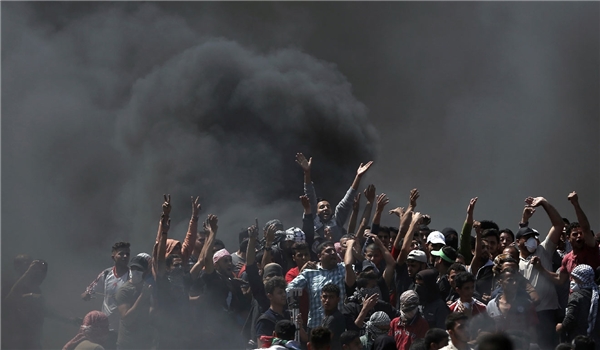
RNA - Nikolay Mladenov gave the warning while addressing the UN Security Council on Wednesday, where he said that people of Gaza are living with "crippling Israeli closures and with diminishing hopes for an end to the occupation and a political solution. Gaza's infrastructure teeters on the verge of total collapse, particularly its electricity and water networks as well as its health system.”
Mladenov called on the international community to join "in condemning in the strongest possible terms the actions that have led to the loss of so many lives in Gaza" since March.
It’s a day of shame not only for the Security Council but also the Muslim world. Most of the UN Security Council’s anti-Israel resolutions are yet to be implemented, especially those that condemn Israel’s illegal settlement construction on Palestinian lands. Also, Most Muslim states sat on their hands and watched as Israeli forces killed at least 63 Palestinians and wounded more than 2,700 during protests near the Gaza fence on the eve of the 70th anniversary of Nakba (Day of Catastrophe). They did nothing as Trump relocated the US embassy from Tel Aviv to occupied Jerusalem Al-Quds.
Quite the contrary, they are yet to send any aid to Gaza to help Palestinians to rebuild the devastated city. With thousands of homes reduced to rubble and its infrastructure in ruins, Gaza's reconstruction will cost billions and require lifting Israel's blockade to allow in building materials. Failure to lift the blockade could cause more conflict in Gaza in the future.
The Palestinians say they need up to $6 billion to fix hospitals, roads, schools, water facilities and factories hit by Israeli shelling and bombing. But all this could happen if Israel first lifts the illegal blockade. The blockade implemented by Israel and reinforced by Egypt has been ongoing since 2007 causing unbearable human suffering.
According to the UN Office for the Coordination of Humanitarian Affairs, at various times, Israel has blocked a full range of goods that include almost everything from wheelchairs, tea, jam, lentils, dry food data-x-items and crayons to stationery, soccer balls, and musical instruments. These restrictions have affected the most vulnerable - babies and children the hardest. A World Health Organization assessment estimates that the level of anemia in babies (9-12 months) is as high as 65%.
Gazans are also living an electricity crisis; the restrictions on the import of spare parts, equipment, and fuel have led to chronic power cuts lasting between 12-16 hours a day. Gazans are forced to live in the pre-Edison age and use candles; however, the impact of power shortages is more profound and goes beyond that. Health services are on the brink of collapse and safe drinking water is in short supply with more than 70% of households in Gaza being supplied with piped water for 6-8 hours only once every two to four days.
According to Fars News Agancy, the blockade has also dealt a devastating blow to the economy of Gaza. According to the World Bank, the blockade has led to an estimated 50% drop in Gaza’s GDP. Today 43% of Gaza's 1.8 million residents are unemployed; a figure said to be the highest in the world, and 80% of families are living below the poverty line. This is a tragic situation and no human being is supposed to endure such misery.
Israel claims that the blockade is necessary to prevent Hamas from obtaining weapons and is necessary to deny it the capability to launch rockets into Israel. However, many of the data-x-items banned or restricted by Israel have no plausible threat to Israel’s security. Bringing the economy of Gaza to the point of complete collapse will not contribute to the security of the occupying regime, nor will the travel prohibitions against Gaza residents who pose no security risk. Furthermore, the Israeli and Egyptian assumption that the blockade will pressure Hamas to give up its rule is a misplaced one.
Meeting the humanitarian needs of Gaza and lifting the blockade are the least the UN Security Council could do in these desperate times. The blockade constitutes collective punishment of the population, and as such, is unlawful and in violation of International Law and International Humanitarian Law. More importantly, the blockade and the human suffering it causes is one of the biggest stains on the conscience of humanity in this time and age. The UN and the Security Council have the responsibility and the obligation to pressure Israel and Egypt to lift the blockade immediately. It’s not only the ethical thing to do, but also the wise thing to do, and is in the interest of regional peace and security.
847/940